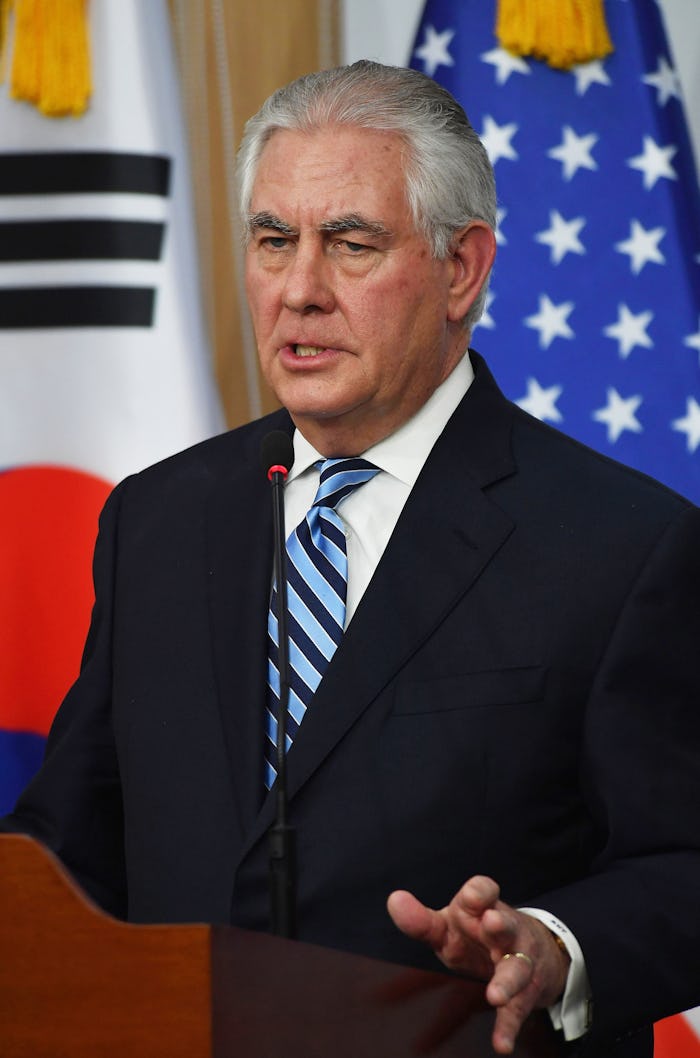News

Is "Military Action" The Same As Going To War?
After making a visit to the Demilitarized Zone dividing North and South Korea Friday, U.S. Secretary of State Rex Tillerson traveled to Seoul to meet with South Korean leaders. In a news conference, Tillerson discussed the increasing tensions between the United States and North Korea, and made it clear that the Trump administration is intending to take a different approach to the communist nation than its predecessors: according to CBS News, Tillerson said the United States' “policy of strategic patience has ended,” and noted that “all options are on the table," when it comes to addressing Pyongyang’s nuclear missile program. Is military action the same as going to war? Tillerson hasn't been specific on what he meant, but given the implications of a more detailed explanation, it's unlikely that he'll clarify his comment anytime soon.
In Tokyo a day earlier, Tillerson said that two decades worth of “diplomatic and other efforts” by the United States hadn't been successful against the “ever-escalating threat" of North Korea's nuclear program, and while he appears to be remaining intentionally vague, his point seems pretty clear. In an effort to ensure that Pyongyang does not become capable of launching a nuclear-tipped missile that could reach the United States, Tillerson suggested that that military action isn't something the government is ruling out, particularly following North Korea's March 6 launch of four ballistic missiles into the Sea of Japan, according to NBC News.
Of course, Tillerson's talk of being open to "all options," doesn't necessarily mean that military action against North Korea is a given. But according to the Associated Press, Tillerson said that, while the United States does not want a military conflict with North Korea, it would be ready to offer up an "appropriate response," if either the United States or South Korea were threatened, according to the Associated Press. And if the government were to opt for that choice? It may not necessarily be war — or, at least, not in a traditional legal sense. That's because, according to AmericanProgress.org, "there are multiple potential sources of authority in U.S. law for military action," and an official declaration of war by Congress is only one of them.
According to TIME, the last time that the United States officially declared war was in 1941, when President Franklin D. Roosevelt declared war on Japan after Pear Harbor. But that obviously wasn't the last time that the United States has been involved in military conflict: since then, troops have also fought in Korea, Vietnam, the Persian Gulf, Afghanistan, and Iraq. What's the difference? Legally, according to TIME, those conflicts have been considered "extended military engagements," not wars, because Congress did not declare war in any of those cases. And in other instances of military force without congressional approval, similar terms have been used to describe what took place. In 2011, for example, Deputy National Security Adviser Ben Rhodes described the United States' military action in Libya as "kinetic military action," not war, according to Politico.
Why the semantics? From a policy perspective, there's value in using a term that isn't "war" — mostly because it carries such a specific connotation, but also because it can affect the consequences and outcome of the decision. According to The Atlantic, unlike an official declaration of war, an authorization of force allows the two government branches "to agree on limited war aims," and means that the military action can end "without a formal surrender." In a way, "military action" can be a method of engaging in war without actually, well, engaging in war.
That doesn't mean that it's automatically the preferred option, or that everyone is onboard. In fact, by not declaring war, many experts have argued that military action is illegal, and that it intentionally side-steps the checks and balances on war that were written into the constitution. More recently, these acts of "non-war" also seem to go against the War Powers Resolution of 1973, which, according to NPR, was designed to prevent the deployment of United States troops without a Congressional declaration of war.
At this point at least, Tillerson's comments appear to be much less about indicating any actual plans of action against North Korea, and more about letting it be known that the United States under Trump doesn't intend to do things the same way as previous administrations have. Given the escalating concerns about North Korea's nuclear abilities, it's also not entirely surprising that Tillerson would want to let North Korea know that the United States is open to taking a hardline approach. But while war with North Korea is still hypothetical, the United States' recent military history also suggests that, if military action is pursued, it might never actually be called "war" at all.